Distinction Between Solicitors and Barristers in the UK Legal System
VerifiedAdded on 2023/01/20
|8
|2327
|52
Essay
AI Summary
This essay delves into the roles of solicitors and barristers within the UK legal system, examining the historical context and the evolution of their distinct functions. It highlights the differences in their training, responsibilities, and the types of cases they handle, with solicitors typically managing paperwork and client interaction while barristers focus on court advocacy. The essay discusses the ongoing debate about merging the two roles, the impact of the 'cab rank rule,' and the shift towards solicitors gaining advocacy rights. It also explores the economic aspects, such as how solicitors often work in partnerships while barristers are independent practitioners, and the implications of negligence claims. The essay concludes by emphasizing that, despite some overlapping functions and the potential for change, the UK legal system maintains a clear distinction between solicitors and barristers, reflecting different career paths within the legal profession.
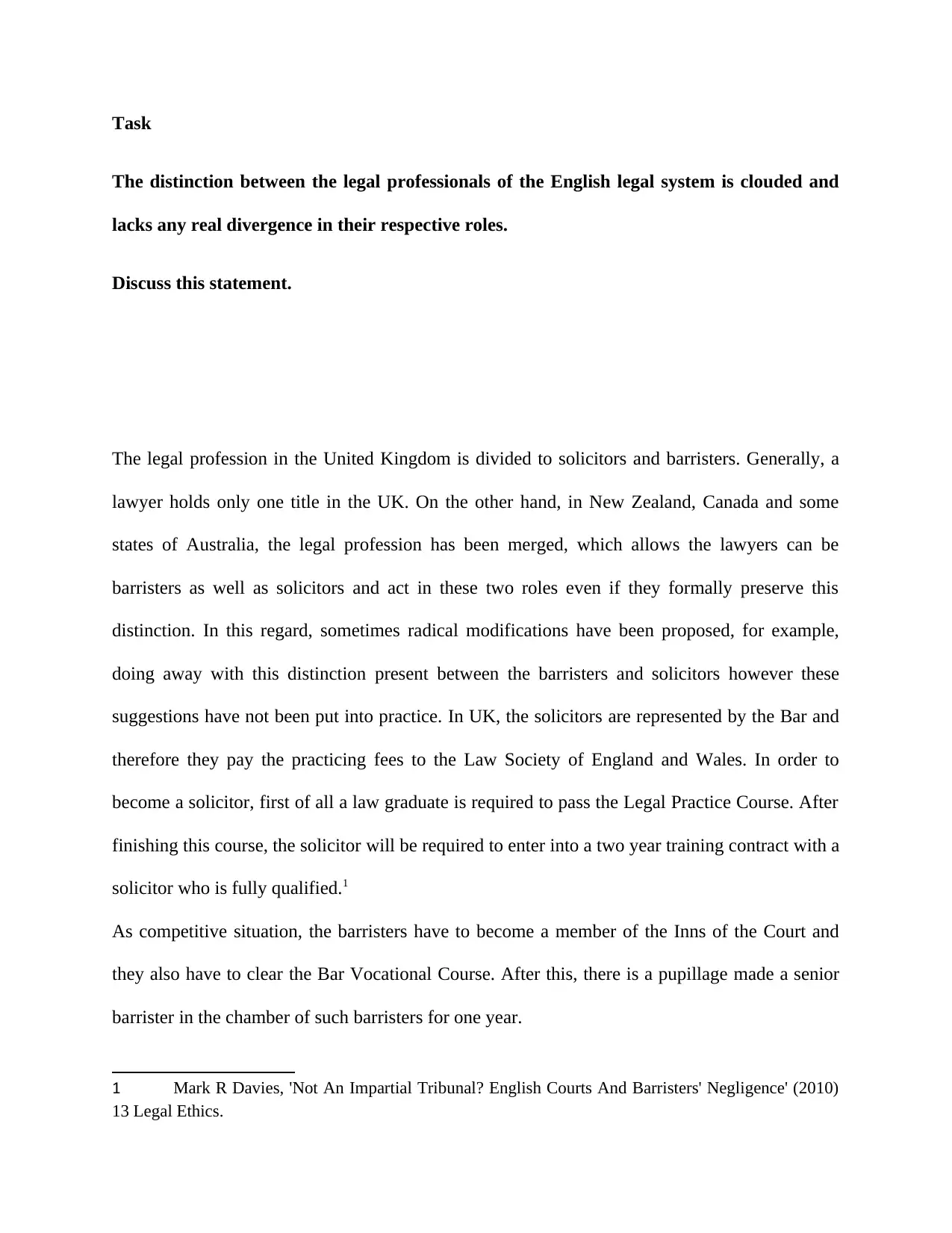
Task
The distinction between the legal professionals of the English legal system is clouded and
lacks any real divergence in their respective roles.
Discuss this statement.
The legal profession in the United Kingdom is divided to solicitors and barristers. Generally, a
lawyer holds only one title in the UK. On the other hand, in New Zealand, Canada and some
states of Australia, the legal profession has been merged, which allows the lawyers can be
barristers as well as solicitors and act in these two roles even if they formally preserve this
distinction. In this regard, sometimes radical modifications have been proposed, for example,
doing away with this distinction present between the barristers and solicitors however these
suggestions have not been put into practice. In UK, the solicitors are represented by the Bar and
therefore they pay the practicing fees to the Law Society of England and Wales. In order to
become a solicitor, first of all a law graduate is required to pass the Legal Practice Course. After
finishing this course, the solicitor will be required to enter into a two year training contract with a
solicitor who is fully qualified.1
As competitive situation, the barristers have to become a member of the Inns of the Court and
they also have to clear the Bar Vocational Course. After this, there is a pupillage made a senior
barrister in the chamber of such barristers for one year.
1 Mark R Davies, 'Not An Impartial Tribunal? English Courts And Barristers' Negligence' (2010)
13 Legal Ethics.
The distinction between the legal professionals of the English legal system is clouded and
lacks any real divergence in their respective roles.
Discuss this statement.
The legal profession in the United Kingdom is divided to solicitors and barristers. Generally, a
lawyer holds only one title in the UK. On the other hand, in New Zealand, Canada and some
states of Australia, the legal profession has been merged, which allows the lawyers can be
barristers as well as solicitors and act in these two roles even if they formally preserve this
distinction. In this regard, sometimes radical modifications have been proposed, for example,
doing away with this distinction present between the barristers and solicitors however these
suggestions have not been put into practice. In UK, the solicitors are represented by the Bar and
therefore they pay the practicing fees to the Law Society of England and Wales. In order to
become a solicitor, first of all a law graduate is required to pass the Legal Practice Course. After
finishing this course, the solicitor will be required to enter into a two year training contract with a
solicitor who is fully qualified.1
As competitive situation, the barristers have to become a member of the Inns of the Court and
they also have to clear the Bar Vocational Course. After this, there is a pupillage made a senior
barrister in the chamber of such barristers for one year.
1 Mark R Davies, 'Not An Impartial Tribunal? English Courts And Barristers' Negligence' (2010)
13 Legal Ethics.
Paraphrase This Document
Need a fresh take? Get an instant paraphrase of this document with our AI Paraphraser
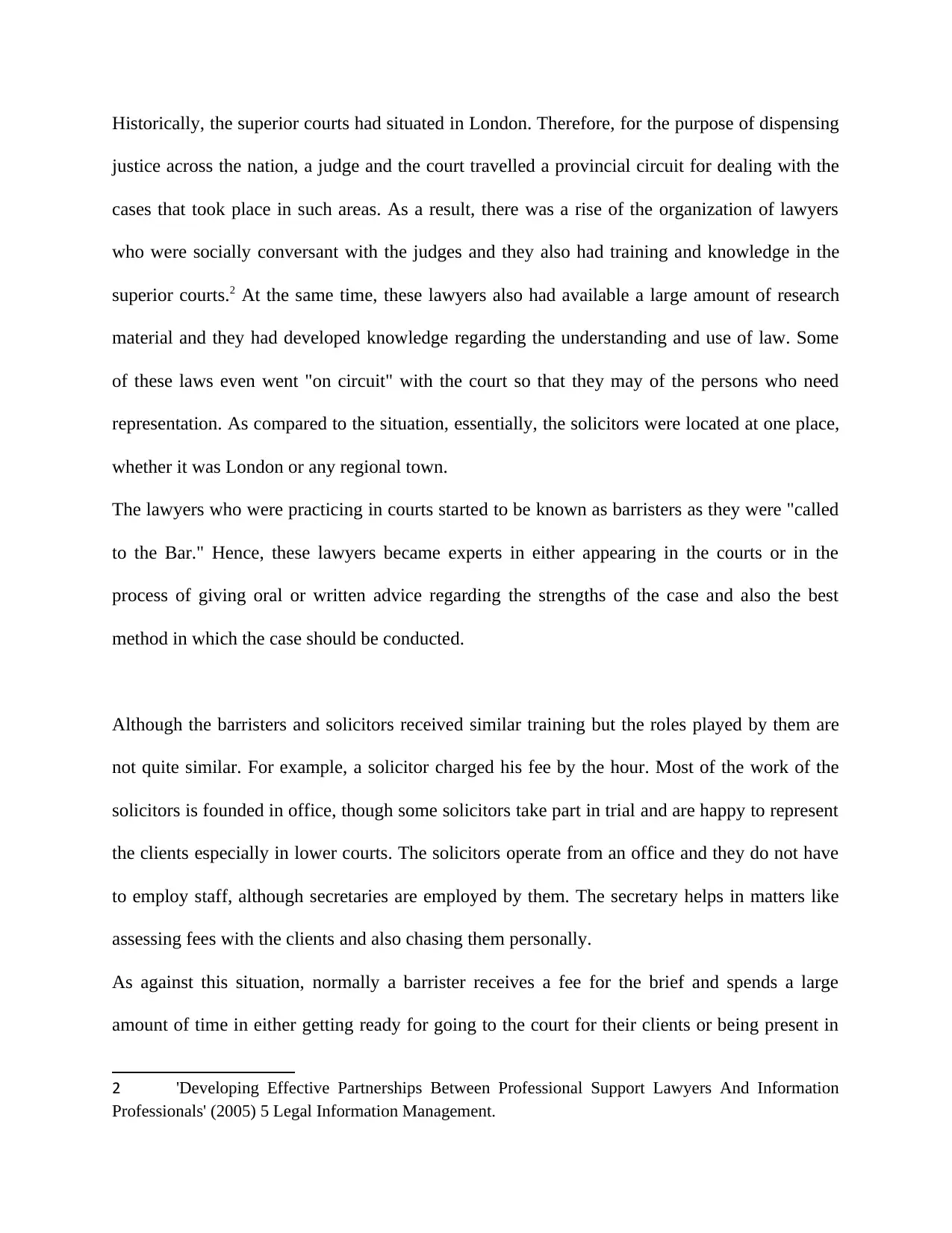
Historically, the superior courts had situated in London. Therefore, for the purpose of dispensing
justice across the nation, a judge and the court travelled a provincial circuit for dealing with the
cases that took place in such areas. As a result, there was a rise of the organization of lawyers
who were socially conversant with the judges and they also had training and knowledge in the
superior courts.2 At the same time, these lawyers also had available a large amount of research
material and they had developed knowledge regarding the understanding and use of law. Some
of these laws even went "on circuit" with the court so that they may of the persons who need
representation. As compared to the situation, essentially, the solicitors were located at one place,
whether it was London or any regional town.
The lawyers who were practicing in courts started to be known as barristers as they were "called
to the Bar." Hence, these lawyers became experts in either appearing in the courts or in the
process of giving oral or written advice regarding the strengths of the case and also the best
method in which the case should be conducted.
Although the barristers and solicitors received similar training but the roles played by them are
not quite similar. For example, a solicitor charged his fee by the hour. Most of the work of the
solicitors is founded in office, though some solicitors take part in trial and are happy to represent
the clients especially in lower courts. The solicitors operate from an office and they do not have
to employ staff, although secretaries are employed by them. The secretary helps in matters like
assessing fees with the clients and also chasing them personally.
As against this situation, normally a barrister receives a fee for the brief and spends a large
amount of time in either getting ready for going to the court for their clients or being present in
2 'Developing Effective Partnerships Between Professional Support Lawyers And Information
Professionals' (2005) 5 Legal Information Management.
justice across the nation, a judge and the court travelled a provincial circuit for dealing with the
cases that took place in such areas. As a result, there was a rise of the organization of lawyers
who were socially conversant with the judges and they also had training and knowledge in the
superior courts.2 At the same time, these lawyers also had available a large amount of research
material and they had developed knowledge regarding the understanding and use of law. Some
of these laws even went "on circuit" with the court so that they may of the persons who need
representation. As compared to the situation, essentially, the solicitors were located at one place,
whether it was London or any regional town.
The lawyers who were practicing in courts started to be known as barristers as they were "called
to the Bar." Hence, these lawyers became experts in either appearing in the courts or in the
process of giving oral or written advice regarding the strengths of the case and also the best
method in which the case should be conducted.
Although the barristers and solicitors received similar training but the roles played by them are
not quite similar. For example, a solicitor charged his fee by the hour. Most of the work of the
solicitors is founded in office, though some solicitors take part in trial and are happy to represent
the clients especially in lower courts. The solicitors operate from an office and they do not have
to employ staff, although secretaries are employed by them. The secretary helps in matters like
assessing fees with the clients and also chasing them personally.
As against this situation, normally a barrister receives a fee for the brief and spends a large
amount of time in either getting ready for going to the court for their clients or being present in
2 'Developing Effective Partnerships Between Professional Support Lawyers And Information
Professionals' (2005) 5 Legal Information Management.
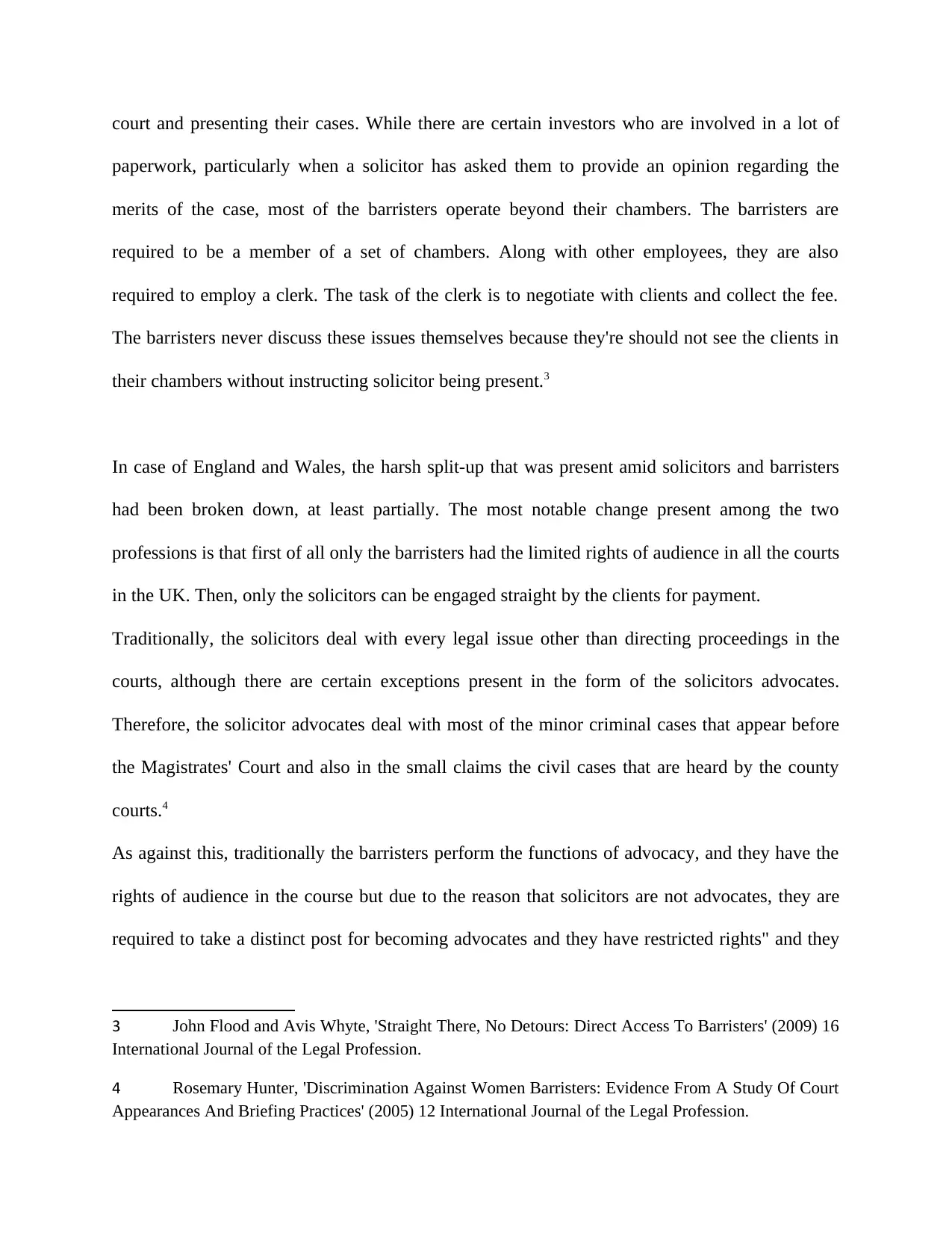
court and presenting their cases. While there are certain investors who are involved in a lot of
paperwork, particularly when a solicitor has asked them to provide an opinion regarding the
merits of the case, most of the barristers operate beyond their chambers. The barristers are
required to be a member of a set of chambers. Along with other employees, they are also
required to employ a clerk. The task of the clerk is to negotiate with clients and collect the fee.
The barristers never discuss these issues themselves because they're should not see the clients in
their chambers without instructing solicitor being present.3
In case of England and Wales, the harsh split-up that was present amid solicitors and barristers
had been broken down, at least partially. The most notable change present among the two
professions is that first of all only the barristers had the limited rights of audience in all the courts
in the UK. Then, only the solicitors can be engaged straight by the clients for payment.
Traditionally, the solicitors deal with every legal issue other than directing proceedings in the
courts, although there are certain exceptions present in the form of the solicitors advocates.
Therefore, the solicitor advocates deal with most of the minor criminal cases that appear before
the Magistrates' Court and also in the small claims the civil cases that are heard by the county
courts.4
As against this, traditionally the barristers perform the functions of advocacy, and they have the
rights of audience in the course but due to the reason that solicitors are not advocates, they are
required to take a distinct post for becoming advocates and they have restricted rights" and they
3 John Flood and Avis Whyte, 'Straight There, No Detours: Direct Access To Barristers' (2009) 16
International Journal of the Legal Profession.
4 Rosemary Hunter, 'Discrimination Against Women Barristers: Evidence From A Study Of Court
Appearances And Briefing Practices' (2005) 12 International Journal of the Legal Profession.
paperwork, particularly when a solicitor has asked them to provide an opinion regarding the
merits of the case, most of the barristers operate beyond their chambers. The barristers are
required to be a member of a set of chambers. Along with other employees, they are also
required to employ a clerk. The task of the clerk is to negotiate with clients and collect the fee.
The barristers never discuss these issues themselves because they're should not see the clients in
their chambers without instructing solicitor being present.3
In case of England and Wales, the harsh split-up that was present amid solicitors and barristers
had been broken down, at least partially. The most notable change present among the two
professions is that first of all only the barristers had the limited rights of audience in all the courts
in the UK. Then, only the solicitors can be engaged straight by the clients for payment.
Traditionally, the solicitors deal with every legal issue other than directing proceedings in the
courts, although there are certain exceptions present in the form of the solicitors advocates.
Therefore, the solicitor advocates deal with most of the minor criminal cases that appear before
the Magistrates' Court and also in the small claims the civil cases that are heard by the county
courts.4
As against this, traditionally the barristers perform the functions of advocacy, and they have the
rights of audience in the course but due to the reason that solicitors are not advocates, they are
required to take a distinct post for becoming advocates and they have restricted rights" and they
3 John Flood and Avis Whyte, 'Straight There, No Detours: Direct Access To Barristers' (2009) 16
International Journal of the Legal Profession.
4 Rosemary Hunter, 'Discrimination Against Women Barristers: Evidence From A Study Of Court
Appearances And Briefing Practices' (2005) 12 International Journal of the Legal Profession.
⊘ This is a preview!⊘
Do you want full access?
Subscribe today to unlock all pages.

Trusted by 1+ million students worldwide
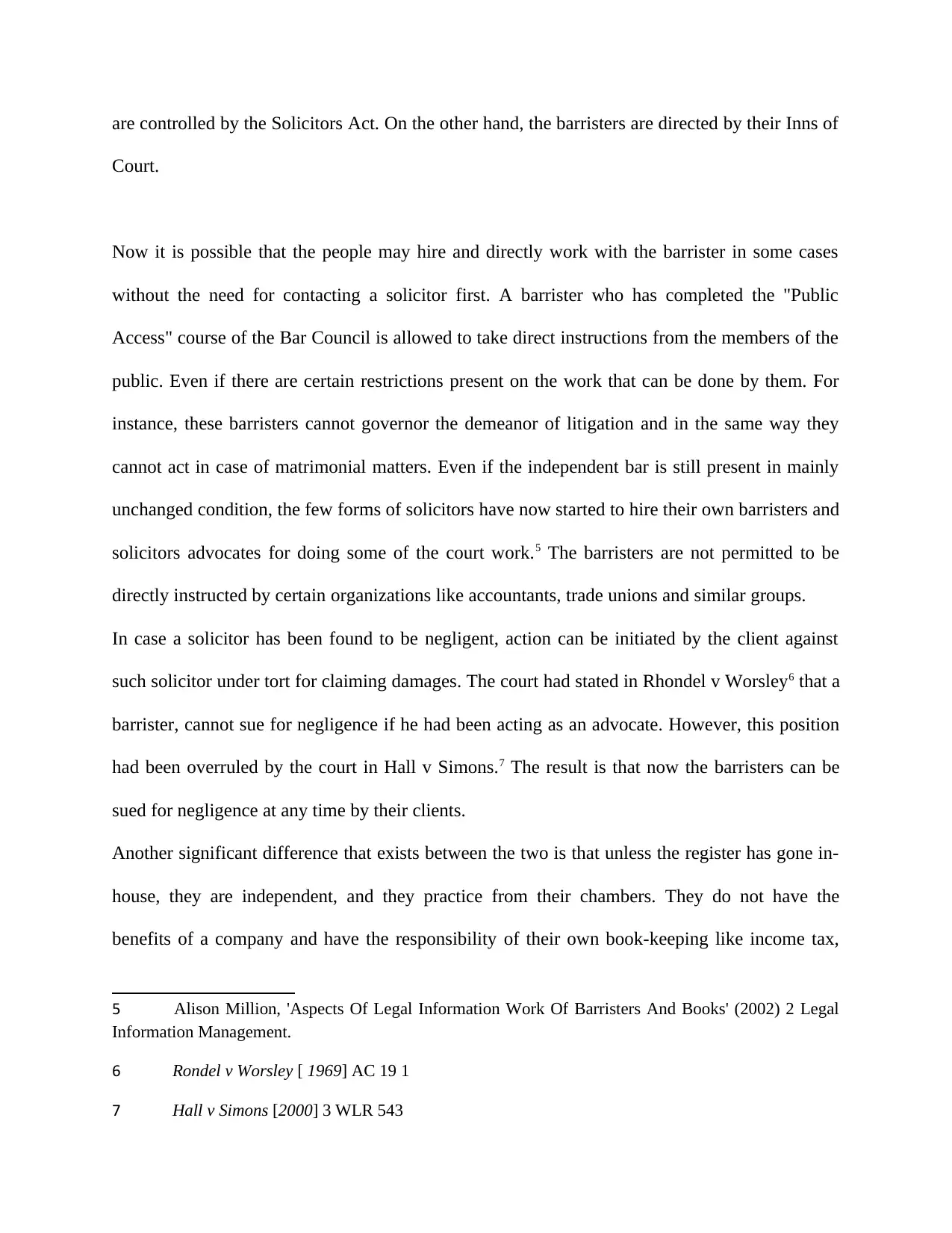
are controlled by the Solicitors Act. On the other hand, the barristers are directed by their Inns of
Court.
Now it is possible that the people may hire and directly work with the barrister in some cases
without the need for contacting a solicitor first. A barrister who has completed the "Public
Access" course of the Bar Council is allowed to take direct instructions from the members of the
public. Even if there are certain restrictions present on the work that can be done by them. For
instance, these barristers cannot governor the demeanor of litigation and in the same way they
cannot act in case of matrimonial matters. Even if the independent bar is still present in mainly
unchanged condition, the few forms of solicitors have now started to hire their own barristers and
solicitors advocates for doing some of the court work.5 The barristers are not permitted to be
directly instructed by certain organizations like accountants, trade unions and similar groups.
In case a solicitor has been found to be negligent, action can be initiated by the client against
such solicitor under tort for claiming damages. The court had stated in Rhondel v Worsley6 that a
barrister, cannot sue for negligence if he had been acting as an advocate. However, this position
had been overruled by the court in Hall v Simons.7 The result is that now the barristers can be
sued for negligence at any time by their clients.
Another significant difference that exists between the two is that unless the register has gone in-
house, they are independent, and they practice from their chambers. They do not have the
benefits of a company and have the responsibility of their own book-keeping like income tax,
5 Alison Million, 'Aspects Of Legal Information Work Of Barristers And Books' (2002) 2 Legal
Information Management.
6 Rondel v Worsley [ 1969] AC 19 1
7 Hall v Simons [2000] 3 WLR 543
Court.
Now it is possible that the people may hire and directly work with the barrister in some cases
without the need for contacting a solicitor first. A barrister who has completed the "Public
Access" course of the Bar Council is allowed to take direct instructions from the members of the
public. Even if there are certain restrictions present on the work that can be done by them. For
instance, these barristers cannot governor the demeanor of litigation and in the same way they
cannot act in case of matrimonial matters. Even if the independent bar is still present in mainly
unchanged condition, the few forms of solicitors have now started to hire their own barristers and
solicitors advocates for doing some of the court work.5 The barristers are not permitted to be
directly instructed by certain organizations like accountants, trade unions and similar groups.
In case a solicitor has been found to be negligent, action can be initiated by the client against
such solicitor under tort for claiming damages. The court had stated in Rhondel v Worsley6 that a
barrister, cannot sue for negligence if he had been acting as an advocate. However, this position
had been overruled by the court in Hall v Simons.7 The result is that now the barristers can be
sued for negligence at any time by their clients.
Another significant difference that exists between the two is that unless the register has gone in-
house, they are independent, and they practice from their chambers. They do not have the
benefits of a company and have the responsibility of their own book-keeping like income tax,
5 Alison Million, 'Aspects Of Legal Information Work Of Barristers And Books' (2002) 2 Legal
Information Management.
6 Rondel v Worsley [ 1969] AC 19 1
7 Hall v Simons [2000] 3 WLR 543
Paraphrase This Document
Need a fresh take? Get an instant paraphrase of this document with our AI Paraphraser
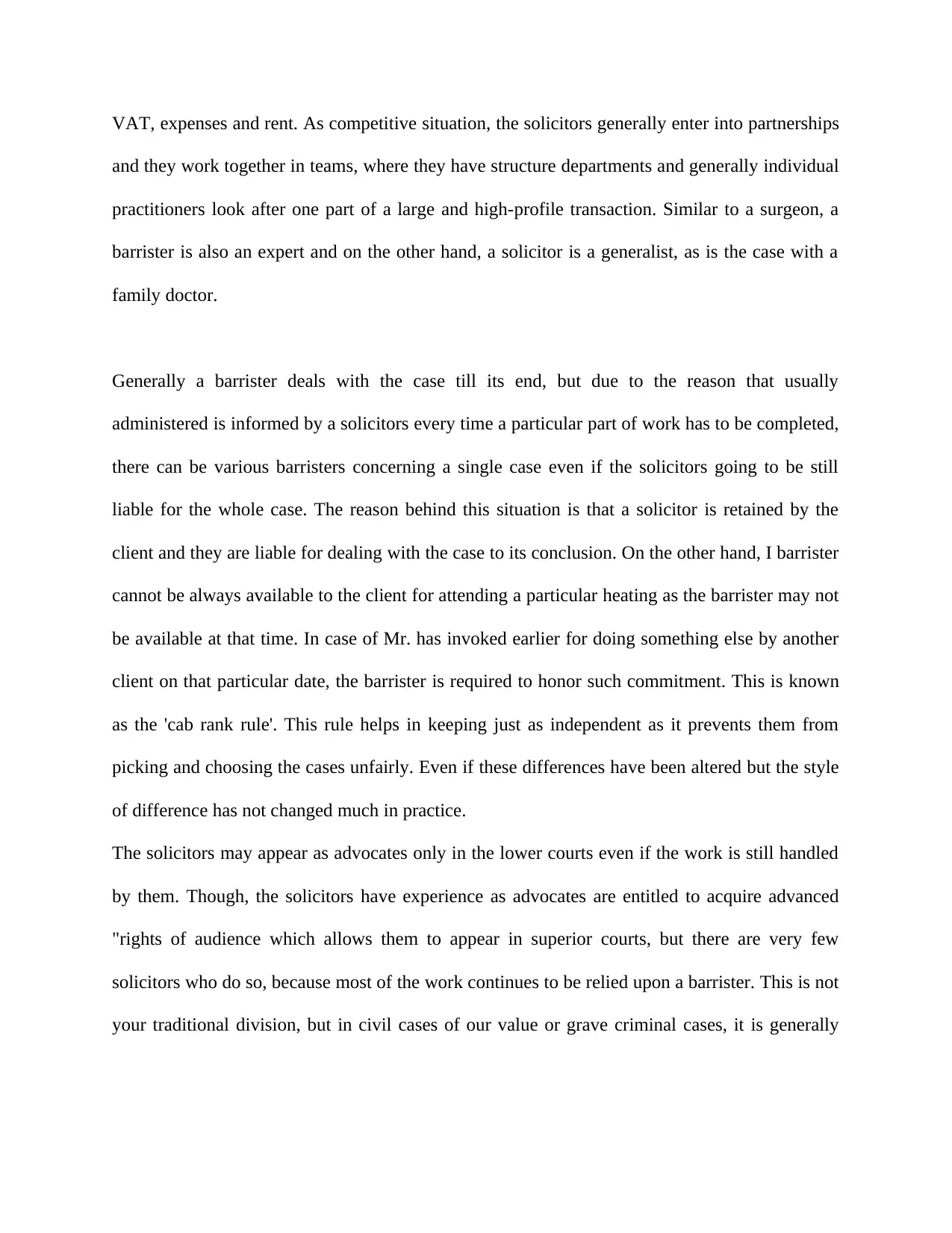
VAT, expenses and rent. As competitive situation, the solicitors generally enter into partnerships
and they work together in teams, where they have structure departments and generally individual
practitioners look after one part of a large and high-profile transaction. Similar to a surgeon, a
barrister is also an expert and on the other hand, a solicitor is a generalist, as is the case with a
family doctor.
Generally a barrister deals with the case till its end, but due to the reason that usually
administered is informed by a solicitors every time a particular part of work has to be completed,
there can be various barristers concerning a single case even if the solicitors going to be still
liable for the whole case. The reason behind this situation is that a solicitor is retained by the
client and they are liable for dealing with the case to its conclusion. On the other hand, I barrister
cannot be always available to the client for attending a particular heating as the barrister may not
be available at that time. In case of Mr. has invoked earlier for doing something else by another
client on that particular date, the barrister is required to honor such commitment. This is known
as the 'cab rank rule'. This rule helps in keeping just as independent as it prevents them from
picking and choosing the cases unfairly. Even if these differences have been altered but the style
of difference has not changed much in practice.
The solicitors may appear as advocates only in the lower courts even if the work is still handled
by them. Though, the solicitors have experience as advocates are entitled to acquire advanced
"rights of audience which allows them to appear in superior courts, but there are very few
solicitors who do so, because most of the work continues to be relied upon a barrister. This is not
your traditional division, but in civil cases of our value or grave criminal cases, it is generally
and they work together in teams, where they have structure departments and generally individual
practitioners look after one part of a large and high-profile transaction. Similar to a surgeon, a
barrister is also an expert and on the other hand, a solicitor is a generalist, as is the case with a
family doctor.
Generally a barrister deals with the case till its end, but due to the reason that usually
administered is informed by a solicitors every time a particular part of work has to be completed,
there can be various barristers concerning a single case even if the solicitors going to be still
liable for the whole case. The reason behind this situation is that a solicitor is retained by the
client and they are liable for dealing with the case to its conclusion. On the other hand, I barrister
cannot be always available to the client for attending a particular heating as the barrister may not
be available at that time. In case of Mr. has invoked earlier for doing something else by another
client on that particular date, the barrister is required to honor such commitment. This is known
as the 'cab rank rule'. This rule helps in keeping just as independent as it prevents them from
picking and choosing the cases unfairly. Even if these differences have been altered but the style
of difference has not changed much in practice.
The solicitors may appear as advocates only in the lower courts even if the work is still handled
by them. Though, the solicitors have experience as advocates are entitled to acquire advanced
"rights of audience which allows them to appear in superior courts, but there are very few
solicitors who do so, because most of the work continues to be relied upon a barrister. This is not
your traditional division, but in civil cases of our value or grave criminal cases, it is generally
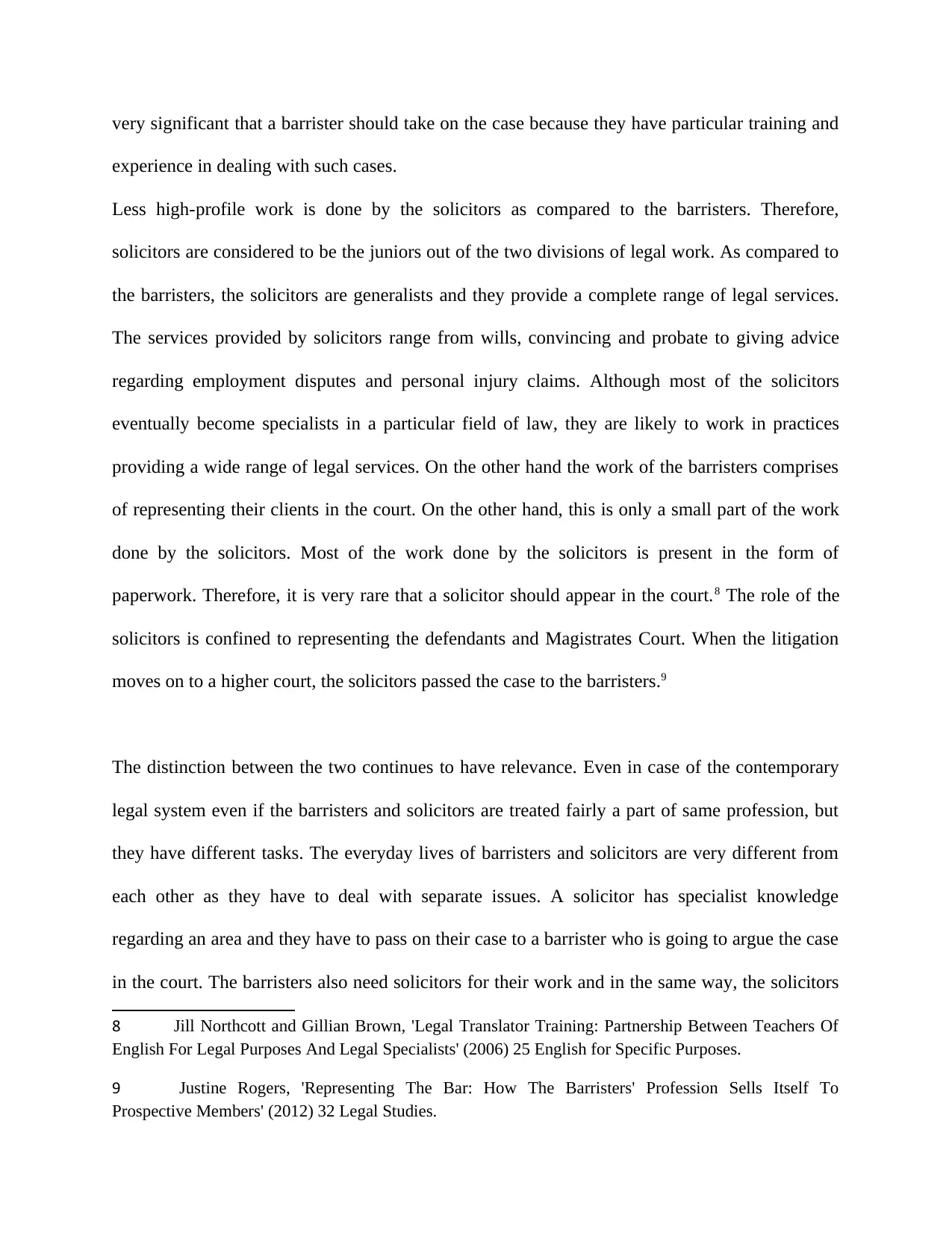
very significant that a barrister should take on the case because they have particular training and
experience in dealing with such cases.
Less high-profile work is done by the solicitors as compared to the barristers. Therefore,
solicitors are considered to be the juniors out of the two divisions of legal work. As compared to
the barristers, the solicitors are generalists and they provide a complete range of legal services.
The services provided by solicitors range from wills, convincing and probate to giving advice
regarding employment disputes and personal injury claims. Although most of the solicitors
eventually become specialists in a particular field of law, they are likely to work in practices
providing a wide range of legal services. On the other hand the work of the barristers comprises
of representing their clients in the court. On the other hand, this is only a small part of the work
done by the solicitors. Most of the work done by the solicitors is present in the form of
paperwork. Therefore, it is very rare that a solicitor should appear in the court.8 The role of the
solicitors is confined to representing the defendants and Magistrates Court. When the litigation
moves on to a higher court, the solicitors passed the case to the barristers.9
The distinction between the two continues to have relevance. Even in case of the contemporary
legal system even if the barristers and solicitors are treated fairly a part of same profession, but
they have different tasks. The everyday lives of barristers and solicitors are very different from
each other as they have to deal with separate issues. A solicitor has specialist knowledge
regarding an area and they have to pass on their case to a barrister who is going to argue the case
in the court. The barristers also need solicitors for their work and in the same way, the solicitors
8 Jill Northcott and Gillian Brown, 'Legal Translator Training: Partnership Between Teachers Of
English For Legal Purposes And Legal Specialists' (2006) 25 English for Specific Purposes.
9 Justine Rogers, 'Representing The Bar: How The Barristers' Profession Sells Itself To
Prospective Members' (2012) 32 Legal Studies.
experience in dealing with such cases.
Less high-profile work is done by the solicitors as compared to the barristers. Therefore,
solicitors are considered to be the juniors out of the two divisions of legal work. As compared to
the barristers, the solicitors are generalists and they provide a complete range of legal services.
The services provided by solicitors range from wills, convincing and probate to giving advice
regarding employment disputes and personal injury claims. Although most of the solicitors
eventually become specialists in a particular field of law, they are likely to work in practices
providing a wide range of legal services. On the other hand the work of the barristers comprises
of representing their clients in the court. On the other hand, this is only a small part of the work
done by the solicitors. Most of the work done by the solicitors is present in the form of
paperwork. Therefore, it is very rare that a solicitor should appear in the court.8 The role of the
solicitors is confined to representing the defendants and Magistrates Court. When the litigation
moves on to a higher court, the solicitors passed the case to the barristers.9
The distinction between the two continues to have relevance. Even in case of the contemporary
legal system even if the barristers and solicitors are treated fairly a part of same profession, but
they have different tasks. The everyday lives of barristers and solicitors are very different from
each other as they have to deal with separate issues. A solicitor has specialist knowledge
regarding an area and they have to pass on their case to a barrister who is going to argue the case
in the court. The barristers also need solicitors for their work and in the same way, the solicitors
8 Jill Northcott and Gillian Brown, 'Legal Translator Training: Partnership Between Teachers Of
English For Legal Purposes And Legal Specialists' (2006) 25 English for Specific Purposes.
9 Justine Rogers, 'Representing The Bar: How The Barristers' Profession Sells Itself To
Prospective Members' (2012) 32 Legal Studies.
⊘ This is a preview!⊘
Do you want full access?
Subscribe today to unlock all pages.

Trusted by 1+ million students worldwide
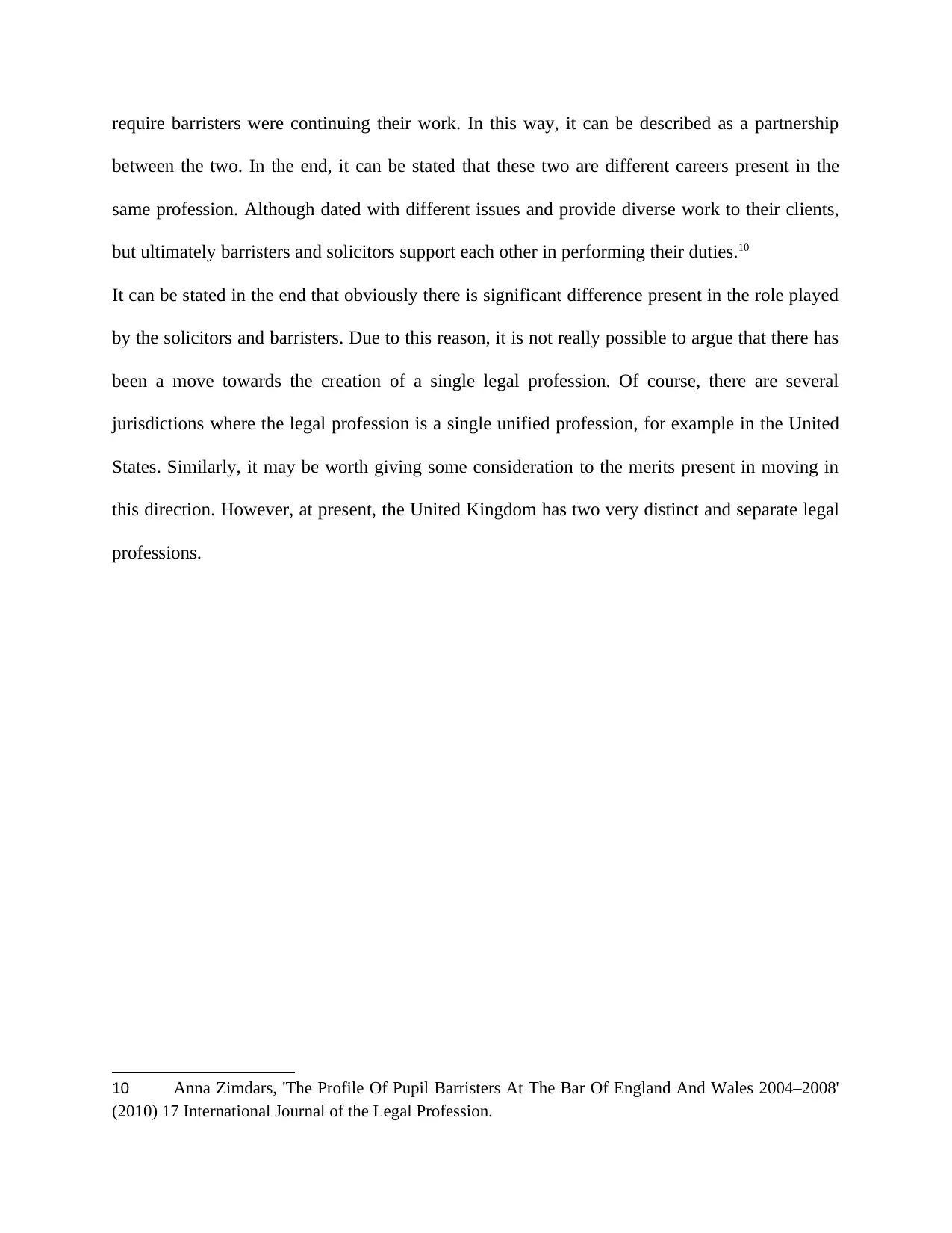
require barristers were continuing their work. In this way, it can be described as a partnership
between the two. In the end, it can be stated that these two are different careers present in the
same profession. Although dated with different issues and provide diverse work to their clients,
but ultimately barristers and solicitors support each other in performing their duties.10
It can be stated in the end that obviously there is significant difference present in the role played
by the solicitors and barristers. Due to this reason, it is not really possible to argue that there has
been a move towards the creation of a single legal profession. Of course, there are several
jurisdictions where the legal profession is a single unified profession, for example in the United
States. Similarly, it may be worth giving some consideration to the merits present in moving in
this direction. However, at present, the United Kingdom has two very distinct and separate legal
professions.
10 Anna Zimdars, 'The Profile Of Pupil Barristers At The Bar Of England And Wales 2004–2008'
(2010) 17 International Journal of the Legal Profession.
between the two. In the end, it can be stated that these two are different careers present in the
same profession. Although dated with different issues and provide diverse work to their clients,
but ultimately barristers and solicitors support each other in performing their duties.10
It can be stated in the end that obviously there is significant difference present in the role played
by the solicitors and barristers. Due to this reason, it is not really possible to argue that there has
been a move towards the creation of a single legal profession. Of course, there are several
jurisdictions where the legal profession is a single unified profession, for example in the United
States. Similarly, it may be worth giving some consideration to the merits present in moving in
this direction. However, at present, the United Kingdom has two very distinct and separate legal
professions.
10 Anna Zimdars, 'The Profile Of Pupil Barristers At The Bar Of England And Wales 2004–2008'
(2010) 17 International Journal of the Legal Profession.
Paraphrase This Document
Need a fresh take? Get an instant paraphrase of this document with our AI Paraphraser
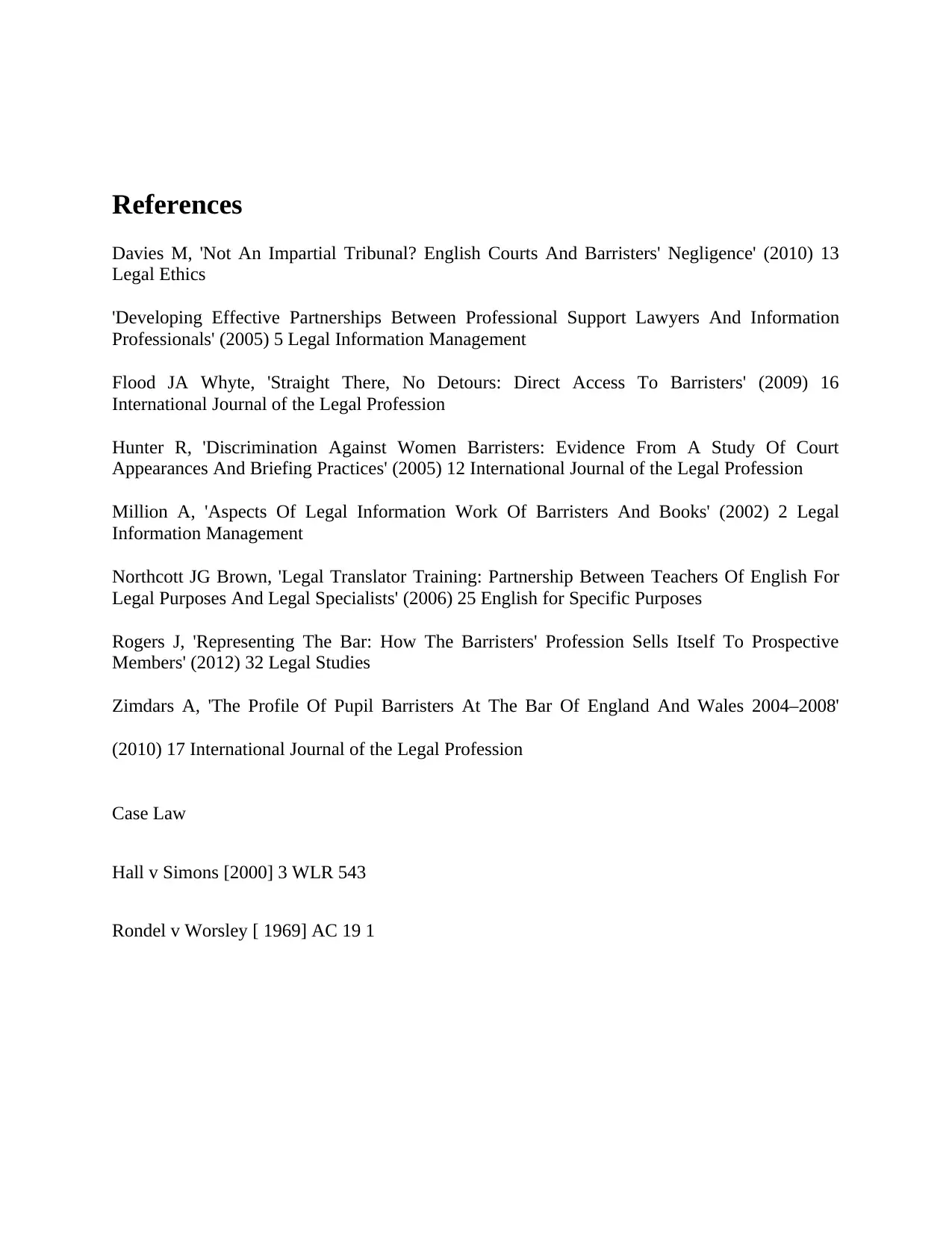
References
Davies M, 'Not An Impartial Tribunal? English Courts And Barristers' Negligence' (2010) 13
Legal Ethics
'Developing Effective Partnerships Between Professional Support Lawyers And Information
Professionals' (2005) 5 Legal Information Management
Flood JA Whyte, 'Straight There, No Detours: Direct Access To Barristers' (2009) 16
International Journal of the Legal Profession
Hunter R, 'Discrimination Against Women Barristers: Evidence From A Study Of Court
Appearances And Briefing Practices' (2005) 12 International Journal of the Legal Profession
Million A, 'Aspects Of Legal Information Work Of Barristers And Books' (2002) 2 Legal
Information Management
Northcott JG Brown, 'Legal Translator Training: Partnership Between Teachers Of English For
Legal Purposes And Legal Specialists' (2006) 25 English for Specific Purposes
Rogers J, 'Representing The Bar: How The Barristers' Profession Sells Itself To Prospective
Members' (2012) 32 Legal Studies
Zimdars A, 'The Profile Of Pupil Barristers At The Bar Of England And Wales 2004–2008'
(2010) 17 International Journal of the Legal Profession
Case Law
Hall v Simons [2000] 3 WLR 543
Rondel v Worsley [ 1969] AC 19 1
Davies M, 'Not An Impartial Tribunal? English Courts And Barristers' Negligence' (2010) 13
Legal Ethics
'Developing Effective Partnerships Between Professional Support Lawyers And Information
Professionals' (2005) 5 Legal Information Management
Flood JA Whyte, 'Straight There, No Detours: Direct Access To Barristers' (2009) 16
International Journal of the Legal Profession
Hunter R, 'Discrimination Against Women Barristers: Evidence From A Study Of Court
Appearances And Briefing Practices' (2005) 12 International Journal of the Legal Profession
Million A, 'Aspects Of Legal Information Work Of Barristers And Books' (2002) 2 Legal
Information Management
Northcott JG Brown, 'Legal Translator Training: Partnership Between Teachers Of English For
Legal Purposes And Legal Specialists' (2006) 25 English for Specific Purposes
Rogers J, 'Representing The Bar: How The Barristers' Profession Sells Itself To Prospective
Members' (2012) 32 Legal Studies
Zimdars A, 'The Profile Of Pupil Barristers At The Bar Of England And Wales 2004–2008'
(2010) 17 International Journal of the Legal Profession
Case Law
Hall v Simons [2000] 3 WLR 543
Rondel v Worsley [ 1969] AC 19 1
1 out of 8
Related Documents
Your All-in-One AI-Powered Toolkit for Academic Success.
+13062052269
info@desklib.com
Available 24*7 on WhatsApp / Email
![[object Object]](/_next/static/media/star-bottom.7253800d.svg)
Unlock your academic potential
Copyright © 2020–2025 A2Z Services. All Rights Reserved. Developed and managed by ZUCOL.





